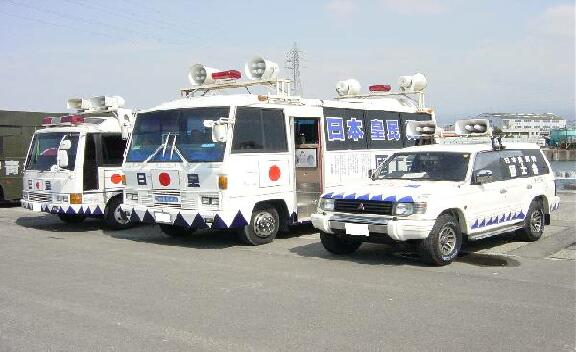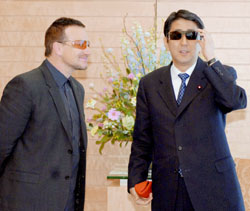The December 7 issue of Shukan Shincho ran a story in its “Heaven’s still a long way off” section about bothersome right-wing sound trucks that plagued the city of Kobe in the months of October and November. Here is a quick translation of the article:
The behind-the-scenes story of the 50 right-wing sound trucks that gathered in Kobe
 A number of police officers watch the intersection intently. There is also an anti-riot squad carrying duralumin shields. Security trucks are stationed at hotels, and several patrol cars can be seen spinning their red lights at the city hall. This is what Kobe looked like on November 26 as a state of heightened security continued throughout the city. Just what was going on that day?
A number of police officers watch the intersection intently. There is also an anti-riot squad carrying duralumin shields. Security trucks are stationed at hotels, and several patrol cars can be seen spinning their red lights at the city hall. This is what Kobe looked like on November 26 as a state of heightened security continued throughout the city. Just what was going on that day?
It all began in late October. The right-wing group Japan Emperor People’s Party submitted an application to use a public parking lot located on the city’s Rokko Island. The city administration granted the group permission saying there was “no reason to refuse them.” It was a contract to use a space that can hold 150 passenger cars for one month.
“Since then, several right-wing group sound trucks started gathering in Kobe. The prefectural police immediately deployed a massive amount of anti-riot police. They installed a checkpoint at the road in front of the parking lot and the two sides started staring each other down. There were some minor fisticuffs when the police searched the person of one of the group members,” says a local journalist.
Then on November 5, 50 sound trucks began a large-scale demonstration in town. A taxi driver who witnessed the event describes the scene:
“I saw them at the intersection on the west side of Kobe station, and it was a doozy. All of a sudden, black and white sound trucks were there as far as the eye could see. It’s quite a sight to see so many at once. They were playing military marches or something, but the volume was low. It was actually kind of creepy, too quiet.”
The real reason
Just what did they gather in Kobe in droves to protest? Masashi Takajima, action committee chairman of the JEPP, which continues its activities in Kobe, had this to say:
“Our recent sound truck activities were intended to protest the North Korea issue. That country is trying to return to the six-party talks while in possession of nuclear weapons. These activities are in response to that. The reasons we chose Kobe are several including the fact that they continue giving tax breaks to facilities owned by [pro-Pyongyang Korean-Japanese group] Songryon.”
However, an official from the Kobe Prefectural Police contends:
“We see their true objectives to lie somewhere else. At the end of September, just before Kobe held the National Athletic Meet [Kokutai], the large hotels in Kobe city established a ‘Liaison Committe to Exclude Organized Crime Groups.’ They made it clear that they would refuse to allow members to stay at or use their facilities. [These recent events] are in protest of that.”
Also, a senior leader of a right-wing group who participated in the sound truck activities murmurs:
“It’s true that the refusal to let gang members stay at hotels was the inspiration for the recent sound truck activity. More than the hotel issue, we intend to put pressure on the prefectural police who called for the exclusion of organized crime members. However, there’s a gag order in place and no one is allowed to tell the ‘real reason.'”
Takajima rebuts these claims, explaining, “That’s totally wrong. We never went to protest at hotels, nor did we talk about that in the sound trucks. A gag order? There’s nothing like that at all.”
The right-wing group quickly vacated the sound trucks from the premises of the parking lot on November 24, the day the contract expired. That is because the city refused to extend the contract. However, Takajima notes, “All we have to do is secure another location to base our activities from. We intend to continue our activities, including during [Christmas light show] Luminarie, when people gather in Kobe.” The battle between the police and right-wing groups looks likely to drag on.



 Japanese TV host Mino Monta was recently
Japanese TV host Mino Monta was recently